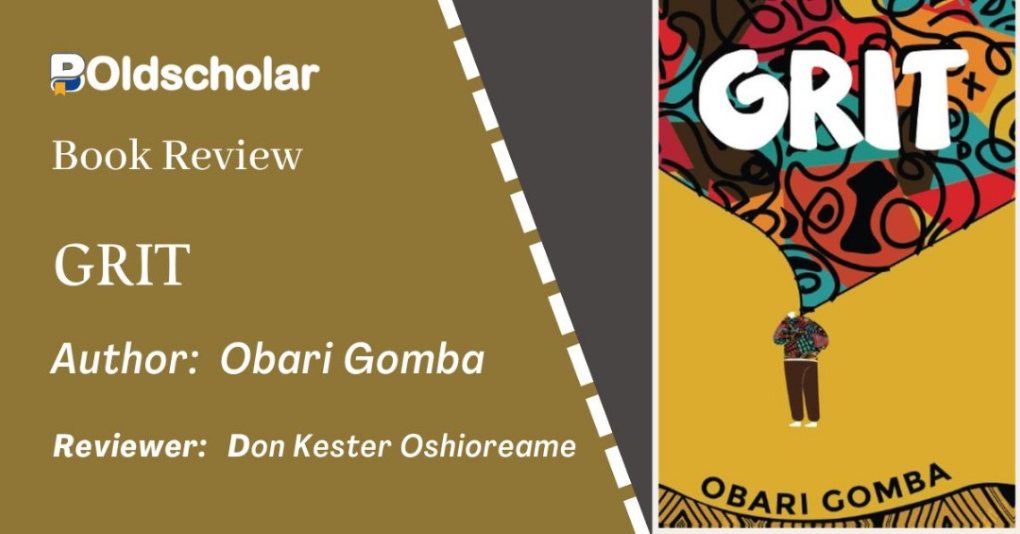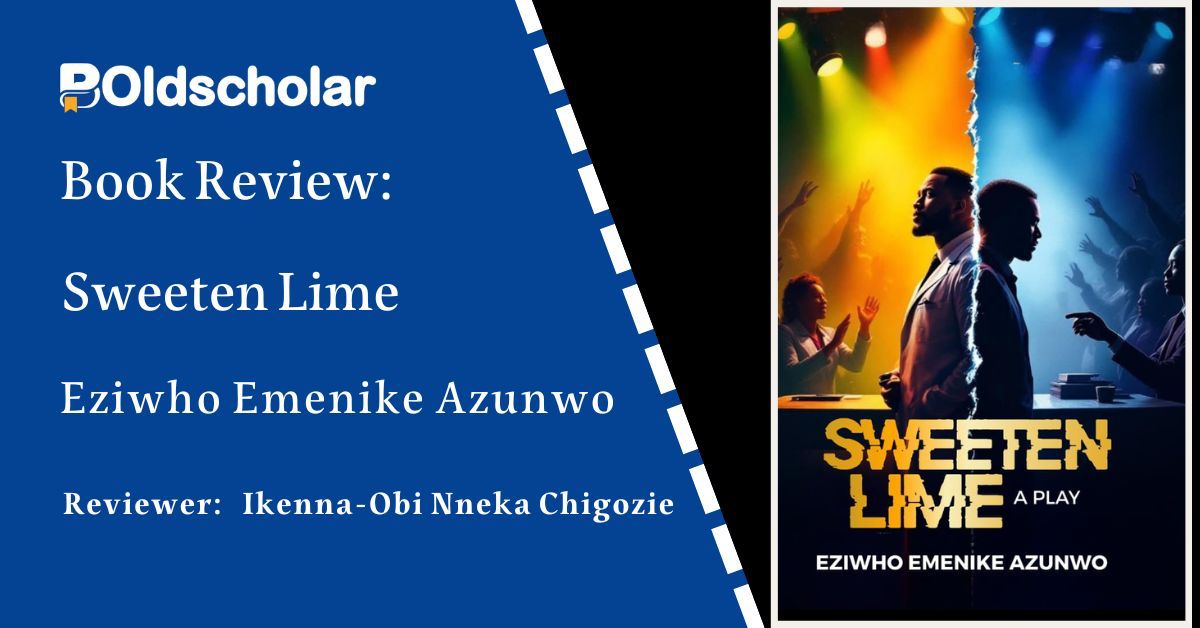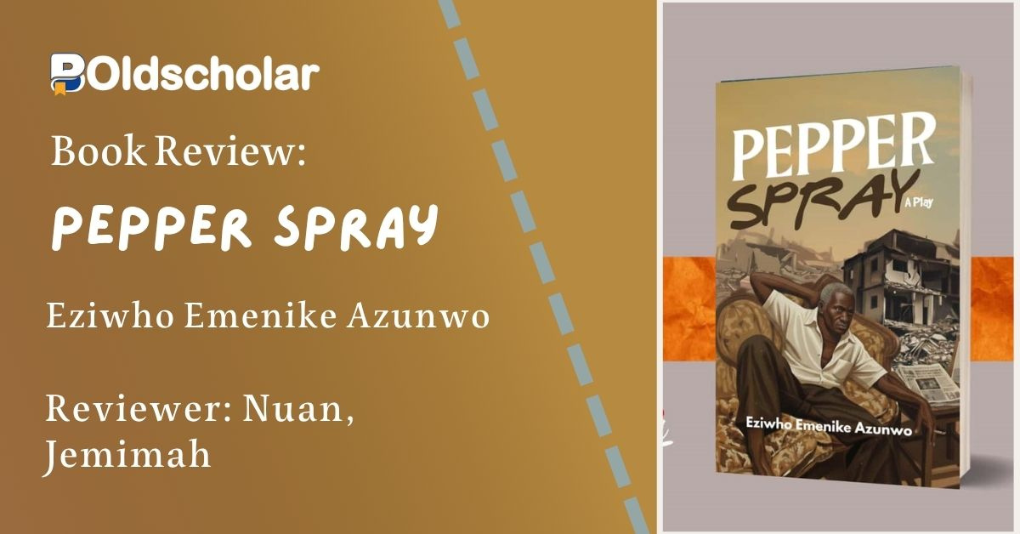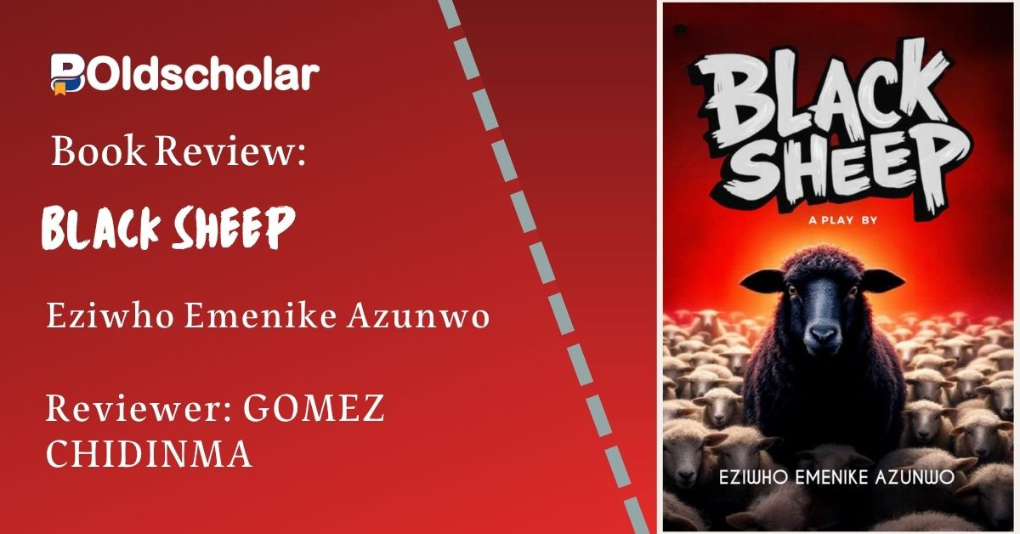Book: GRIT
Author: Obari Gomba
Reviewer: Don Kester Oshioreame
Publisher: Hornbill House of the Arts, Lagos
Year of Publication: 2023
Pages: 87
Frantz Fanon asserts: “The future will have no pity for those men (and women) who, possessing the exceptional privilege of being able to speak words of truth to their oppressors, have taken refuge in an attitude of passivity, of mute indifference, and sometimes of cold complicity.” Obari Gomba in this political drama titled GRIT has wisely rescued himself from that concentric circle of those who would just sit idly and do nothing about the leadership misadventure in our political space by daring to do a satirical exposé on the core of the issue plaguing us as a people which is leadership or the lack of purposeful or sincere leadership. For the most part what we are living with as people is self-serving leadership.
Through GRIT, Obari Gomba has eminently etched his name in the literary hall of fame of dramaturgy in the ideological tradition in Nigeria, which used to be the exclusive preserve of greats like Femi Osofisan, Bode Sowande, Tunde Fatunde, Olu Obafemi, Ken Saro Wiwa, etc.
In specific terms, Obari Gomba as a committed dramatist dared to challenge the status quo by breaking the “fourth wall” and letting the reader into the deep recesses of his character's private life beyond the public perception buoyed by charisma. GRIT probes the persona of the would-be political actors thus drawing our attention to three critical issues meant for our appreciation:
The character of the politician.
The competence of the politician and,
The consequences of the politician's action or inaction.
POLITICAL CHARACTERS IN GRIT
Concerning the characters in GRIT, I would like to go against the norm. Rather than address and consider the characters as individuals, I would prefer to address them in clusters as stereotypes. I classify them into five categories; first, Pa Nyimenu and his band of tired comrades; Pa Panti and Baatom, could be classified as the ‘wasted’ generation (apologies to Wole Soyinka), the second category is the opportunists represented by Oyesllo, Okote, the third category are the feminists represented by Nmade, Bulu, Matefi, the fourth being the enablers represented by White Eye, Kakwa, Obata, Nwewe, etc and the last, the gaps defined by the children sent away to their paternal grandparents for safety, thus denying them of the vital training and transmission of requisite values that only parents can transfer.
Furthermore, in dramatic literature, a dramatic persona or character is known by what the character says of himself/herself, what other character says of him/her and the author’s description of him/her. So, in interrogating this text, we can find the kind of characters we have allowed free reign in our political and leadership ecosystem.
In the light of the above, let’s consider these statements as a window into the character of our political leaders so called.
OYESLLO: ... I am struggling to get my pension from the army I served. I am jobless, a retired army officer that did not get to steal from the state and the army, a wounded man, a broke man, almost utterly broken. This politics is my rehabilitation. Why do you find it difficult to understand my position? (Gomba, 2023, p. 5).
We see therefore that our physical and psychological space have been invaded by jobless, wounded, broke and almost utterly broken persons who chanced their way into politics. By this revelation alone, Obari Gomba has morally indicted and thrown at us a challenge to begin to investigate the character (s) and question those we readily queue behind and support in every election cycle.
Furthermore, we can equally consider what Nmade says of Oyesllo her husband and his response?
NMADE: My husband is back from war, but he has remained in the mode of war. How long? Forever? Oh dear, I know that the land is perpetually at war with itself. But you are back home, retired, an ex-soldier. Why not leave the war at the front? Why have you brought it home? Why are you at war with your brother?
OYESLLO: Politics is war by other means; war is Politics by other means.
It may be safe to suggest that Oyesllo bears semblance with Lejoka Brown the protagonist in Ola Rotimi’s Our Husband Has Gone Mad Again as an ex-army officer who is venturing into politics for the benefits derivable from it.
What one can glean from the dialogue above (between Oyesllo and his wife, Nmade) is that an individual enmeshed in a cocktail of traumatic emotions and mental ill health making the proverbial corridors of power his destination of choice instead of a rehab home. Politics has become his rehabilitation. What a travesty.
POLITICAL COMPETENCE IN GRIT
If “...the quality or state of having sufficient knowledge, judgment, skill, or strength (as for a particular duty or in a particular respect) …” is what competence means, then the description of the characters in this text, falls abysmally short of expectation in the political competence ratio. What we have are accidental political leaders.
Opportunists, who exploit the system and take undue advantage of the people by gas lighting them. It contrasts the concepts of institutional memory and succession planning, which if practised, can be a process to perpetuate competence and advance good governance as opposed to imposition, butt and boot licking or ‘loyalty’ so-called, which has become the qualification to run for office these days in our polity. In the text for instance, what qualified Oyesllo and Okote to run for office is sentiment; the emotions stirred by their mum’s unjust murder by the establishment.
POLITICAL CONSEQUENCE IN GRIT
Ultimately, based on the lack of character and competence by political actors in the text, the consequence wasn’t unlikely.
Firstly, we see regret, disappointment and disillusionment. In the words of Pa Nyimenu:
PA NYIMENU: There are powerful figures in every community who ensure that the truth is in bondage. The world's systems of power are structured to bind all humans and keep them subject to domination or control. Sometimes, the victims of power become enablers because we are all not as morally smart as we claim we are (Gomba, 2023, p. 2).
Pa Nyimenu succumbs to the powerlessness of the people in the face of the systems and structures put in place by the political actors, and that is because he has jettisoned the most important structure in society which is the family. If he placed premium on parenting and raising his family rightly, the political actors won’t have been able to penetrate, overwhelm and perhaps defeat his family.
On the other hand, Bambo (an active member of the cabal) understands the implication and the danger of allowing the will of the people to prevail in the political equation, as he asserts on page 73:
BAMBO: We have to commend ourselves for bringing both brothers on this bumpy train. [Everyone laughs.] They are dangerous. They are threats to our control of the constituency. It took us time to build this power, and we cannot let things go to the dogs (Gomba, 2023, p. 73).
At this juncture, we may infer that it was a parenting failure of the part of the ‘failed’ generation that led to this generational degradation as can be justified from the dialogue on page 66, Scene X:
NYIMENU: We disbanded the Grit Club, our small resistance group, when we began to raise families. We did not want our spouses and children to be caught in the crossfire of our activism (Gomba, 2023, p. 66).
PANTI: You made a good call, sir.
BAATOM: A good call, yes. Except that evil does not go to sleep when good men take a break.
GRIT by Obari Gomba is full of images, symbols, thought provoking concepts to make us rethink our political process and be spurred to engage, partake and not stay aloof or become armchair critics.
Finally, may I say, it will take consistent GRIT to free ourselves from the firm and suffocating grip of, “…an incorrigible cabal of mindless predators” to borrow from Wole Soyinka.
Don Kester Oshioreame
Reviewer, GRIT, by Obari Gomba (2023 NLNG Award Winner for Literature). 26/07/2024
Presented @Alliance Francaise, Port Harcourt Rivers State.
Organized by August Meeting.
Share this post





Don Kester...
Oladipupo Marvelous, I would love to read your work some day, when it is published. Have a great time researching. Cheers.
Oladipupo Marvelous
Awesome, definitely Using this book for my project, lets explore the leadership ecosystem in our country and the solution: Premium Parenting.